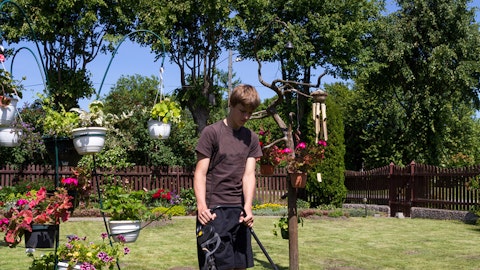Kevin O’Donnell: Yes. If I can add. I think Bob is absolutely right. The year-to-date numbers look great. I think it’s important also that we were positioning the portfolio for yesterday. What happened yesterday is, we brought in the Validus book into a portfolio that had been optimized to accept it. The way — from an underwriting perspective, that book is now reflected in REMS. And the way we reflect that book is through in-force gross written premium. We have said that we believe going-forward the gross premium that we will retain $2.7 billion with upside. The actual portfolio on an in-force basis that we brought into REMS yesterday was $3.7 billion. What in-force premium means is, that’s the amount of premium that underwriters have the ability to touch over — that’s embedded in the Validus portfolio.
So we have significant optionality when we talked about the $2.7 billion. And we have grown tremendously because we brought in $3.7 billion of diversified premium against our capital base yesterday. So when I think about it, we can’t isolate a quarter without talking about Validus because so much of what we did was to be prepared to accept that portfolio and to be operational against it today.
Alex Scott: Yes, that all makes a lot of sense. Second one I had is, I guess, just on new capital formation in the market, any observations around what you’re seeing headed into year end and how impactful that maybe to the supply and demand dynamic. And I guess, sort of in the same vein, any commentary around your third-party vehicles and ability to go out and get capital to take advantage, rethinking [indiscernible]
Kevin O’Donnell: Sure. You know, one comment, I mean, since I don’t believe there’ll be a class of 2023. I think it’s very late in the cycle for that capital to come in. It certainly can’t be operational by 1/1. If we were raising equity, we would have done it by now, because we would want to have interactive conversations with clients and brokers. So there may be equity raise between now and year end. But from the lens that we would place on it, it’s late. From an ILS perspective, we’re a different capital partners business than others. We traditionally — most of our vehicles are rated. So draft, collateral and other things that has been the bane of the market don’t really exist on our platform. The fact that we underwrite all the risk, we are the largest investor in DaVinci.
We share the risks in [indiscernible] across our other — across our platform. So there is a sense of security in the underwriting that’s achieved at RenRe for investors to feel comfortable. The structures of the vehicles provide them more flexibility than traditional ILS platforms. And many of our investors, for that reason, are in more than one vehicle. We are not constrained to grow ILS. We are optimizing the platform against the ILS opportunities. We want to bring to that capital and the risk that we want to retain on our own balance sheets. I think the rest of the market will remain a bit challenged to increase — certainly will not be able to increase at a scale that’s disruptive to our strategy.
Alex Scott: Very helpful. Thank you.
Operator: Our next question comes from Brian Meredith with UBS. Your line is open.
Brian Meredith: Yes, thank you. Kevin, I’m just curious. There’s been some other companies have talked about some potential significant opportunities in the casualty reinsurance marketplace. Could you kind of talk about what you think from that perspective?
Kevin O’Donnell: Yes. I think — from a reinsurance perspective, I think we’re in a strong position. I think our capacity is strongly needed coming in with the bigger portfolio with Validus were more important to bigger clients. We believe that there is increased recognition for the required rate at the primary level that nearer to the benefits proportional. And reinsurers seem to be developing disciplined press on ceding commissions. So when I look at it, I think not every line-of-business is equally attractive. Not every client is equally skilled in leveraging into those attractive markets. I think we’re in the best spot to grow with the most skilled cedence in the most preferred lines. There’s been a lot of discussion about rate change in D&O and professional lines.



